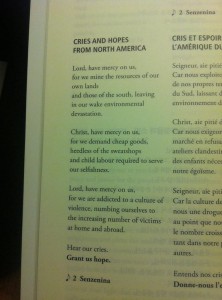Senzenina


North America’s contribution to the litany: an acknowledgement of our complicity and agency in resource extraction. Photo by the Rev. Bruce Myers, Anglican Church of Canada.
“…Your people’s lament is echoed in your own deep groans that drain rivers dry, flood lakes and tear up trees. Oh God of life, breathe new life in all our efforts for justice and peace so that we can together with you, declare once more, that indeed it will be good again.”
–Cries and Hopes of Africa, prayers from the Opening Worship WCC Assembly, Busan
Senzenina, which is Xhosa and Zulu for “what have we done,” was a poignant refrain in the opening worship of the 10th Assembly of the World Council of Churches. Chronicling the struggles and challenges of each continent in turn, the first prayers were a relentless litany of violence, injustice and ecological devastation. Almost every possible issue facing our communities and churches was recounted as two representatives of our Korean hosts ceremonially applied ashes in an emotive dance.
It was almost too much, wave after wave of pain, and yet in the midst of it all something powerful happened—a Spirit-filled strengthening in the gathered community. In engaging in the forgotten liturgical act of lamentation we became stronger. Walter Brueggemann says that “The laments are refusals to settle for the way things are. They are acts of relentless hope that believe no situation falls outside of Yahweh’s capacity for transformation.”
To begin this Assembly of the World Council of Churches—the most diverse Christian gathering in the world—with lament is to place every moment of injustice, every moment of ecological harm, on our collective agenda for action. Nothing falls outside of God’s dream for justice and therefore, nothing is outside the church’s mission. We are here, close to 4000 people in the opening worship, to be together as global church, but with a profound responsibility—to address anew the many ways that we fall short of God’s justice and peace. Every cry that we heard in worship must be a credible subject of our deliberations as we discern, as ecumenical movement, how we are to intensify our commitments.
It was relentless, yes, but ultimately “relentless in hope.” May the words “what have we done” shift from repentance to those worthy of celebration as we work with renewed spirit in the faith of Yahweh’s collaborative transformation.








